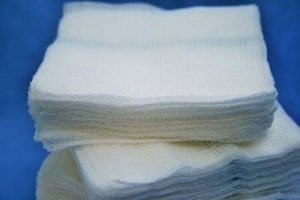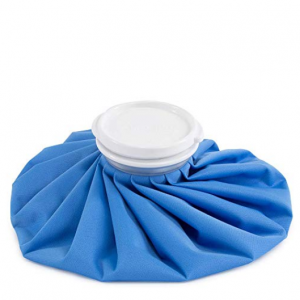First Hour
PAIN MEDICATION/ ANTIBIOTICS
- Take prescribed medication as indicated by the doctor immediately following your surgery. If instructed by your doctor, you should take over the counter ibuprofen or Advil every 4 hours continuously for the first two days. Take the first dose immediately and before the local anesthesia has worn off. You may use the prescription medication on top of and in addition to the ibuprofen or Advil tablets as needed. Be cautious when taking all medications, as most pain management medications will more than likely cause stomach upset.
- If you have been placed on antibiotics, take the tablets as directed. Antibiotics will be given to help prevent or treat infection. Discontinue antibiotic use in the event of a rash or other unfavorable reaction. Please contact Dr. Sam or the office if you have any questions or concerns.
GAUZE PRESSURE
 Controlling bleeding after an extraction or surgery is a matter of applying continuous pressure over the area for an extended period of time. Bite down firmly on the gauze packs that have been placed over the surgical areas, make sure they remain in place. Do not change them for the first 30 minutes unless the bleeding is heavy.
Controlling bleeding after an extraction or surgery is a matter of applying continuous pressure over the area for an extended period of time. Bite down firmly on the gauze packs that have been placed over the surgical areas, make sure they remain in place. Do not change them for the first 30 minutes unless the bleeding is heavy.- After 30 minutes, place enough new gauze to obtain pressure over the surgical site for another 30 minutes if needed. The gauze can then be changed as necessary (Only if gauze is soaking wet with blood). It is best to slightly moisten gauze with tap water and loosely fluff for more comfortable positioning.
- Bleeding from oral surgery may take up to 24 hours to fully stop. Once bleeding has stopped, you will no longer require the use of gauze.
ICE PACKS
- Swelling around the mouth, cheeks, eyes, and sides of the face is not uncommon. Swelling and mild bruising is normally expected and is usually proportional to the surgery involved. This is the body’s normal reaction to surgery and eventual repair. Many times the swelling will not become apparent until the day following surgery and will not reach its maximum until 2-3 days post-operatively.
- Swelling can be minimized by using cold packs, applied firmly to the cheek nearest to the surgical area. This should be applied twenty minutes on and twenty minutes off during the first 24 hours after surgery.
- If you have been prescribed medication to minimize swelling, be sure to take it as directed.
REST
- Restrict your activities the day of surgery and resume normal activity when you feel comfortable. Immediately following surgery you will want to rest and limit all activity.
AFTER THE FIRST HOUR
PERSISTENT BLEEDING
- A certain amount of bleeding is to be expected following surgery. Slight bleeding, oozing or redness in the saliva is not uncommon for the first 24 hours post surgery. If bleeding persists or becomes heavy you may substitute the pressure gauze with a tea bag to bite on for 20 or 30 minutes. The tea contains a beneficial chemical that locally constricts blood vessels.
- To minimize further bleeding, relax, rest and refrain from any type of vigorous movement or exercise. If bleeding remains uncontrolled, please call the office for further instructions.
ORAL HYGIENE
- You can brush your teeth the night of surgery, but rinse and brush GENTLY.
PROTECT THE BLOOD CLOT
- Do not rinse vigorously, smoke or drink with a straw for the first 48 hours following surgery.
- Chemicals in cigarettes are caustic and will significantly delay healing, increase post-operative pain, swelling, risk of infection, and dry socket.
NAUSEA AND VOMITING
- Nausea and vomiting are a common side effect of Oral and IV sedation, and many narcotic medications. It generally improves within 4-6 hours. In the event of nausea and/or vomiting following surgery, do not take anything by mouth for at least an hour, including the prescribed pain medication. Avoid all foods until you are feeling hungry and try sipping small amounts of clear liquids to prevent dehydration. 7up and/or ginger ale are a good choice to help with nausea. You should sip slowly over a 15 minute period. Once the nausea subsides, you can start eating food and restart the prescribed pain medication. If the nausea and vomiting do not resolve, please contact Dr. Sam or your dental office.
DIET
- Immediately following surgery liquids should be initially taken. You may eat anything soft by chewing away from the surgical sites. Your food intake may be limited for the first few days due to a reduced appetite. It is important to eat not only because of the medications you are taking, but because nourishment is essential to healing. You will feel better, have more strength, and heal faster if you continue to eat.
- Stick to soft and cold diet for the first 24 hours, like Ice cream, milkshakes, yogurt, smoothies, etc. Keep in mind to use a spoon or sip from the cup, but absolutely no straws.
PAIN MEDICATION PRECAUTIONS
- The prescription medication given to you by your doctor may contain narcotics and thus can cause drowsiness, decreased reaction time, blurred vision and a change in mental status. Do not drive, operate dangerous machinery, make important decisions, or perform strenuous exercise while taking these medications. Failure to follow these instructions increases your risk of causing injury to yourself and others.
POST –OP DAY 2 AND BEYOND
ORAL HYGIENE
- Keeping your mouth clean after surgery is essential. No vigorous rinsing should be performed during the healing process. The day after surgery you should begin rinsing at least 5-6 times a day (especially after eating) with a warm cup of water mixed with a teaspoon of salt. This mixture not only helps keep the area clean but it also helps swelling. Avoid commercial mouthwashes, the alcohol they contain may irritate the surgical site. You should brush and floss your teeth normally- just be gentle at the surgical sites.
HEALING
- Normal healing after oral surgery should be as follows: The first three days after surgery are generally the most uncomfortable. It is normal to experience an increase in pain and swelling during this period. Beginning on the fourth day, things should start to improve. You should be more comfortable and, although still swollen, can usually begin a more normal diet. The remainder of the post-operative course should be gradual, steady improvement. If you do not see continued improvement, please call Dr. Sam or your dental office.
DRY SOCKET
- A dry socket is a term to describe a painful but not serious postoperative condition that results from the premature loss of the blood clot. It usually occurs 3-5 days after surgery. An increasing amount of throbbing pain around the affected socket, which may radiate up to the ear or through the entire jaw is an indication you may have a dry socket. If this pain is not responsive to the pain medication prescribed, this condition may require an office visit where your dentist or Dr. Sam will gently place a medicated dressing into the tooth socket. Pain relief is often immediate once the site is treated.
SHARP EDGES/SUTURES
- Sutures may be placed in the area of surgery to minimize postoperative bleeding and to aid in healing. Sometimes the sutures disintegrate early or are dislodged. This is no cause for alarm, simply remove the loose suture from your mouth and discard it. The sutures will typically dissolve within a couple of weeks. If you feel something hard or sharp edges around the surgical areas, it is likely you are feeling the bony walls, which once supported the extracted teeth or the ends of the sutures. Occasionally small slivers of bone may work themselves out during the following weeks. This is normal but if they cause concern or discomfort, please call Dr. Sam or your dental office.
NUMBNESS
- If numbness of the lip, chin, or tongue occurs there is no cause for alarm. As stated before surgery, this is usually temporary in nature. You should be aware that if your lip or tongue is numb, you could bite them and not feel the sensation. If you experience this altered sensation please contact Dr. Sam or your dental office. Appropriate care can be initiated, if indicated, at that time.
FEVER / DIZZINESS
- Slight elevation of temperature immediately following surgery is not uncommon. If the temperature persists, notify the office.
- Many patients feel dizzy following surgery. You should be careful going from the lying down position to standing. Remember, many times you were not able to eat or drink prior to surgery. It also can be difficult to take fluids. The prescribed pain medications may also make you feel dizzy. You could get light headed when you stand up suddenly. Before standing up, you should sit for one minute then get up.
MUSCLE SORENESS
- Sore throats and pain when swallowing are not uncommon. Since muscles are swollen, the normal act of swallowing can become painful. This pain will usually subside in 2-3 days.
- Stiffness (Trismus) of the jaw muscles may cause difficulty in opening your mouth for several days following surgery. This is a normal post-operative event which will resolve in time.
* Following these instructions will assist you, but if you have any questions or concerns about your progress, please contact Dr. Sam or your dental office.

